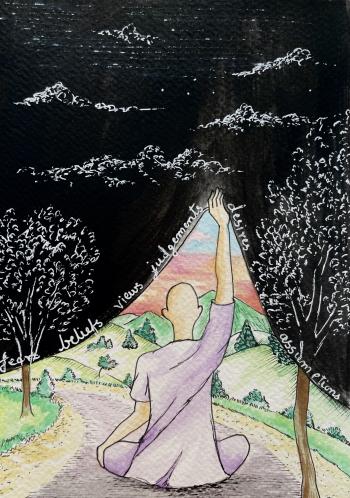Humility


The dictionary definition of humility is “a modest or low view of one’s own importance.” This always gave me a sense that humility was somehow related to the estimation of my capabilities and that to be humble was to somehow downplay myself.
Occasionally, I encountered explanations where people alluded to some life changing aspect of humility. Although I vaguely connected with this idea intellectually, I struggled to bring its meaning into my own life.
My first entry point into humility came a few years ago while I was on a ten day silent retreat. Between meditations I reflected on a particular person that often triggered me, trying to understand the root cause of my frustration. At one point I had an epiphany that has affected my life ever since.
I realized that I felt triggered because the person was assertive about something that I felt strongly about but ultimately experienced uncertainty around. In truth, my actual orientation to the subject at hand was one of not knowing. My reactivity was an avoidance of the discomfort of that position. As I acknowledged that I didn’t know and embraced that not knowing, my attitude transformed from defensiveness into openness and curiosity. I didn’t realize it at the time, but that moment was my first genuine experience of humility.
For me, humility has come through recognizing the subtle ways in which arrogance permeates my life. It is the arrogance of needing to be right, of projecting my worldview on to others, of all the judgements and predispositions that I carry with me all the time. It is a filter between my self and the experience of life as it actually is.
Zen Buddhism has the concept called beginners mind – a state of experiencing each moment as if for the first time. For me, humility has been the root of such aspiration and simultaneous acceptance of just how far I often feel from any such mastery. Yet I consider this very recognition to be the seed of humility – what could be more arrogant than thinking that I can be free of judgement and bias as a human being?
The paradox of this experience is that while it has enabled me to create space between my judgements and the world around me, it has also enabled me to be more forgiving of myself as I am, with all of my judgements as they are.
I find the practice ever elusive. As soon as I think – ah, I have found it! – immediately I observe some new facet of my life lacking in humility. My experience has been subtle and paradoxical. Humility is not something that I have attained. Rather what I have attained is a lasting awareness of my own arrogance. This has gradually opened my mind to the possibility of experiencing the world more directly.
How can I perceive the majesty of life when I am continuously projecting my beliefs on what I experience? My desires, my fears, and my assumptions obscure the actuality of what is there. They make it smaller. They make it something that fits into my conception and comfort zone.
The significance of this nuance is that it is not me that is limited. It is the filter through which I process my experience. And, without that filter, who am “I”? This puts an entirely different spin on the dictionary definition shared earlier. It puts into question the importance of my worldview, not my self. But it also opens an inquiry into the very nature of that self.
Interestingly, the word humility originates from the Latin word humus, meaning earth or ground. The word is related to the word homo, meaning human. Perhaps the virtue’s original significance implies humanness or humanity.
As I continue to unpack the many layers of this experience, I wonder how does one learn or teach humility? Is it possible to precipitate an awareness of genuine humility within another?
There is the mythology of master and student. The master engages the student in endless mundane tasks while the student boils over in frustration, waiting to learn the “real” lessons. Perhaps the real lesson is humility and the mundane exercises are there to break down resistance to something that can only be experienced directly.
Excerpted from here.
SEED QUESTIONS FOR REFLECTION: How do you relate to the notion that we might attain a lasting awareness of our arrogance as opposed to humility? Can you share a personal story of a time you experienced the world more directly without projecting your beliefs onto the experience? What helps you experience directly without projection?
Add Your Reflection
11 Past Reflections

On Oct 18, 2023 Mark wrote :
1 reply: Lorenz | Post Your Reply

On Oct 17, 2023 Douglas Clapp wrote :
Post Your Reply

On Oct 16, 2023 Jeanne Missey Osgood wrote :
Post Your Reply

On Oct 16, 2023 Mariette wrote :
1 reply: Barbaras. | Post Your Reply

On Oct 14, 2023 Stream wrote :
Love this discussion, the article by Lorenz and reflections I have read- This is about being Menches- real human beings who care about each other and the world we live in- Gate Gate Paragate Parasam Gate Bodhisvaha-
let's all go together- beyond our limited consciousness-
Right now I am communicating with a man who is not trusting me and I believe has false info about me- I am finding a balance that will not sell me short but also honor his needs- The Mayan En La Kesh, Alaken helps always- I am another you and you are another me
1 reply: Barbaras. | Post Your Reply

On Oct 13, 2023 Jagdish P Dave wrote :
Post Your Reply

On Oct 13, 2023 David Doane wrote :
Post Your Reply

On Oct 12, 2023 Mamta Nanda wrote :
It feels much needed coming upto the solar eclipse, an invitation for new beginnings. To be able to wish and welcome the new with openness and curiosity feels sublime. Thank you